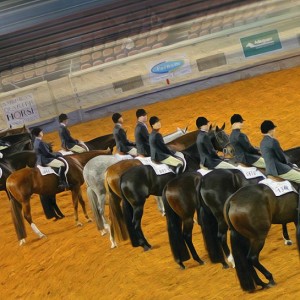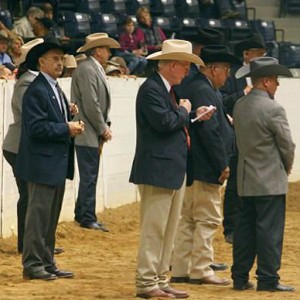Recertification: A Judge’s Friend or Foe?
By Chris Crumpler
 To be certified means to be qualified. Many different professions require qualification and demand that minimum requirements are met. These qualifications and requirements are made to be exhaustive and fully encompassing in order to ensure the highest in quality of a service or product.
To be certified means to be qualified. Many different professions require qualification and demand that minimum requirements are met. These qualifications and requirements are made to be exhaustive and fully encompassing in order to ensure the highest in quality of a service or product.
Beginning in December 2014, AQHA will put into effect a recertification rule for all of its judges. How does a judge get his or her card? What are the qualifications required for getting this card? Many specific rules and requirements exist, but, overall, will recertification be something that’s feasible and helpful for judges?
Each respective breed association has their own rules that management must follow when hiring judges for a show. The idea of recertification is something that the AQHA Judges Committee has discussed for years. The task force’s recommendation to implement a judge recertification program was unanimously approved by the full Judges Committee. The program was then further defined and ultimately approved by the AQHA Executive Committee, with minor changes.
All AQHA all-around judges will be required to recertify their judging credentials. This will be done using a test that will be administered to all all-around judges. The recertification procedure will comprise of a written test over the AQHA Official Handbook of Rules and Regulations and a video test on five core classes. According to the announcement about this new rule that was recently put forth by AQHA, the test will be comprised of multiple facets. Some of the aspects of the test will include the following:
• The closed rulebook test will be made up of 50 questions in true/false and multiple choice formats. During the last ten minutes designated for the rulebook test, the judges will be allowed to open their rulebooks.
• Any judge needing special assistance will be assisted by a member of the Judges Committee in a different location.
• Anyone caught copying or talking will be immediately excused from the testing process. All cell phones, iPads, and electronic devices shall be turned off. If anyone has an electronic device on, they will be immediately excused from the testing process.
• The 2014 video test will focus on five core classes: western riding, trail, reining, horsemanship, and hunt seat equitation. The test will be made up of runs at one of the AQHA World Championship shows. There will be between six to eight runs on each video test.
• It will take a score of 80 percent or higher to pass the rulebook test. It will take a score of 75 percent or higher to pass the video test. The 75 percent will be figured on the average of the five video tests. Anyone scoring below 75 percent on the average of the five classes will have to retake the video test(s). Judges scoring below 75 percent will be allowed to continue judging until they retest, but will be informed that they must attend the March Judges Education Seminar and retest to improve their score. Additionally, judges who do not pass the test the first time may not book any additional judging assignments until after they have attended the March Education Workshop, re-tested, and passed.
• If the judge is retesting to raise their average of the five classes to the 75 percent level, they have the option of retesting on as many classes as they choose. However, the score of the class(es) they retest added to the original score of the remaining classes must be 75 percent or higher. The retesting will be held at the March Judges Educational Seminar or at a place determined by the AQHA Senior Director of Judges.
• Judges failing the second recertification will be removed from the list of approved AQHA judges and must reapply to become an AQHA judge.
• After the initial testing is complete, a DVD of the video tests, with voiceovers on the runs, will be sent to all judges along with their individual scores for educational purposes.
• Judges will be required to recertify every two years.
 This list is exhaustive and tackles many facets of the rule. To clarify and define some of the terms this rule sets forth, we spoke with the AQHA Director of Judges himself, Mr. Alex Ross. Ross says, “The term ‘all-around’ is an important one to focus on. What we mean by it is, judges who judge any kind of competition that includes more than one event. i.e. the typical horse show — halter, english, and western.” When describing the different terms and talking about the recertification test, Ross says, “Our exhibitors, trainers, and their connections see the ‘end product’ – the judges in the arena judging a class. The objective of the recertification program is to get the classes judged correctly.” This objective is one that has been long in progress for the Association and one that Ross is very proud of. “It takes time and effort to do all this, but it makes judging more accurate,” he says.
This list is exhaustive and tackles many facets of the rule. To clarify and define some of the terms this rule sets forth, we spoke with the AQHA Director of Judges himself, Mr. Alex Ross. Ross says, “The term ‘all-around’ is an important one to focus on. What we mean by it is, judges who judge any kind of competition that includes more than one event. i.e. the typical horse show — halter, english, and western.” When describing the different terms and talking about the recertification test, Ross says, “Our exhibitors, trainers, and their connections see the ‘end product’ – the judges in the arena judging a class. The objective of the recertification program is to get the classes judged correctly.” This objective is one that has been long in progress for the Association and one that Ross is very proud of. “It takes time and effort to do all this, but it makes judging more accurate,” he says.
As with any new rule, some opposition and many conflicting viewpoints have arisen to question what this rule means. Many concerned members are asking what the core classes are exactly and why were they selected as so? Questions about the availability to take the test have been expressed and the concern of an age gap are on the front lines of this conversation. By interviewing some influential AQHA judges, these themes are evident and key issues are addressed.
When talking with Kelly Chapman, she discusses the rule in a very positive manner. “I’m very supportive of this rule,” she says. “Not designed to be punitive in any way, this rule encourages judges to proactively show and demonstrate their knowledge and involvement on current industry standards.” Her concern for keeping up with industry standards makes her an advocate for this rule. She explains. “As with most sports, the level of competition at our shows continues to evolve and improve, in most cases. Great horsemen and women who are judges have the experience to evaluate classes and reward horses and riders on ability and talent. This rule doesn’t change that concept at all.”
Chapman wants to keep that kind of enthusiasm about education alive in equestrian sport. “I don’t know any great horseman who judges that doesn’t want to get it right every time they step into the pen and to continue to grow and be the best judge they can be, no matter how long they have held a card.” Chapman says, “I think this is a positive step and continues to allow those horsemen and women who routinely step into the pen to evaluate, rank, and ultimately, reward, the American Quarter Horse. It gives them the opportunity to apply their experience and increase accountability.”
Another voice that supports this rule is that of Ryan Kail. He is enthusiastic about this rule and says, “Being new to judging, I know that the process won’t be an easy one to complete, but it will allow for better judging everywhere.” He compares it to the process of initially obtaining a judge’s card. “They make you do a lot, but it makes you better at what you do.” A young voice championing this new rule gives it a freshness and different perspective. Kail talks about how other associations already have this rule, such as the NRHA. He says, “In associations like that, they can focus on one event, which makes testing much easier than it will be for the all-around events.”
Kail was sure to emphasize that, “Experience cannot be taught and those who have decades of it may be against this rule, but AQHA is trying to uphold some kind of accountability. This will be a good change in the end.”
Finally, Gigi Bailey weighed in on this rule. Because of her extensive work with her initiative called the “Ask a Judge” Program, her opinion toward the rule is positive. In her program, judge accountability is of the utmost importance. This particular program is something that Bailey is very passionate about. “This program makes judges appear human and allows them the chance to interact with exhibitors, giving them time to explain their placings. People amaze me when they act surprised after they ask what happened in a class and they get the response from a judge to read the rulebook.”
Bailey’s work with this program has given her experience with many different judges which allows her to speak confidently about this issue. “Mister Ross has assured us that these tests and recertifications will be about things that we, as judges, use everyday,” she says. “There are a lot of things and rules in the Association’s rulebook, but this is an effort that seems feasible.” She goes on to say that, “Every judge’s career ebbs and flows naturally. Something like this rule will ensure accountability throughout these careers.”
Bailey does express concern about the way this rule will be implemented, but also says, “Recertification every two years will keep things fresh and ensure judges are up to date with new rules and industry standards.”
“The AQHA is represented by each judge at each show. Every time we step out there, we represent (the association). I know that I want to do that to the best of my ability each and every time.”
Bailey speaks about the way that this rule and a judge’s representation of the Association are intertwined when she says, “This rule will make people serious about judging and keep all accountability high.”
Just to recap, the recertification rule and test will take a score of 80 percent or higher to pass. It will take a score of 75 percent or higher to pass the video test. The 75 percent will be figured on the average of the five video tests. Anyone scoring below the 75 percent on the average of the five classes will have to retake the video tests. Judges scoring below a 75 will be allowed to continue judging until they retest, but they will be informed that they must attend the March Judges Education Seminar and retest to improve their score. Additionally, judges who do not pass the test the first time may not book any additional judging assignments until after they have attended the March Education Workshop, retested and passed.
Potential issues with this type of rule are numerous, however many different benefits can come from this rule, too. Benefits may include taking away opinion from judging and leveling the playing field, and taking the art of judging to a new level that requires everyone to have the same rules in mind for each event. The benefits may double as negatives as well. Exhibitors will be the ones that ultimately see these effects trickle down. It will be important to ask yourselves, is this rule something that will be beneficial to me as well as the Association?
Certain themes have evolved surrounding the emergence of this rule. As from the discussions above, we see issues such as age gap, experience, testing concerns, and accountability. Several concerns have arisen with these themes, but overall the rule has been met with a kind of general acceptance already. When the rule goes into effect, this acceptance should allow for a smooth transition.
The sparked controversy over this rule is one that has many sides to each argument, both for and against. Defined as “to renew the certification of, especially certification given by a licensing board,” recertification is not a new feat in most professions and hobbies. This rule will bring about new concerns, but will also start to combat existing issues that the AQHA has been dealing with for years. This “step in the right direction” may not mark the conclusion of this issue, but it will be a great starting point for conversation. The opinions of these judges might give you an insight as to how this rule may work and the benefits that will surely follow. Overall, developing this rule at this time will be a good thing for the Association. As discussed already, negatives and positives will evolve from this rule, and changes will most likely need to occur in order to make it the best that it can be for the Association and its membership.
Click here to read the complete article from the Equine Chronicle January/February 2014 Issue, Vol. 17 Number 1.










